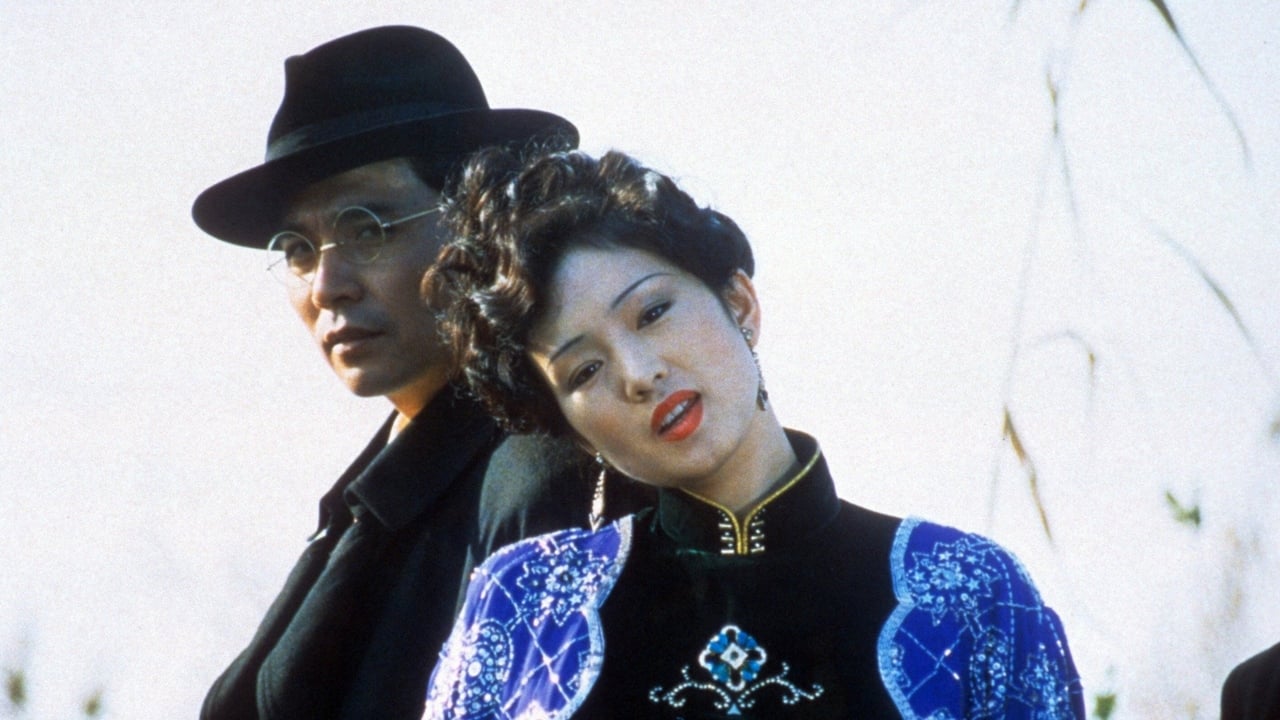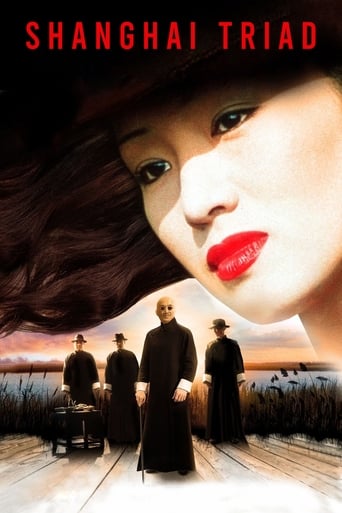



What a waste of my time!!!
Masterful Movie
It isn't all that great, actually. Really cheesy and very predicable of how certain scenes are gonna turn play out. However, I guess that's the charm of it all, because I would consider this one of my guilty pleasures.
View MoreClose shines in drama with strong language, adult themes.
View MoreThere is no dispute Yimou Zhang is still the best-known working director from China, but after the lucrative-but-critics-panning CURSE OF THE GOLDEN FLOWER (2006, a 6/10), which also marks a reunite with Goddess Li Gong after 11 years, his successive works (A WOMAN, A GUN AND A NOODLE SOUP 2009, a Chinese adaption of Coen Brothers BLOOD SIMPLE. 1984; UNDER THE HAWTHORN TREE 2010, an over-innocuous love story under the backgrounds of Cultural Revolution of the 1960s and 70s; and his latest, a westerner saving Chinese women from Japanese invaders during Nanking 1937 stars the newly Oscar-crowned Christian Bale, THE FLOWERS OF WAR 2011; I haven't watch any of them yet) all have received pretty lukewarm feedbacks and even dire dissatisfaction from both audience and critics. So since then his domestic reputation has been quite disproportionate to his renowned international prestige. SHANGHAI TRIAD, Yimou Zhang's period drama set in Shanghai of 1930s, has eluded me for 17 years, but sincerely culminates Zhang's ingenuity in his virtuoso cinematography scale, while the story itself, doesn't match his previous masterpieces, namely, TO LIVE (1994, an 8/10), THE STORY OF QIU JU (1992, an 8/10), JU DOU (1990, an 8/10) or his groundbreaking debut RED SORGHUM (1987, a 9/10). The ugly truth is that Zhang is never an exceptional storyteller, if he has an excellent script (the said four films), with the aid of which the films surge onto an elated dimension of ethos, otherwise, the outcome could be a lesser achiever notwithstanding with stunning shots abound. Take this film for example, it owns an experimental use of camera angles, DP Yue Lv even garners an Oscar nomination, for me the cunning tactic is the maneuver of two drastically different terrains: Shanghai's lavish villa for the richest and an ominous countryside island with wild weed backdrops, they are in parallel to dissect the storyline with an absorbing visual momentum which flourishes successfully to meet the eyes, especially for those non-Chinese audience bearing some exotic curiosities.The cast is solid, Gong Li (at her prime-time being the muse of Zhang's oeuvre) does provide a wide range of emotional scopes as the boss' mistress whose ill-fated destiny sparks a woeful compassion, and surpasses the common dolly bird blandness, but the film still has too many corny characters (basically all the male characters here, with Baotian Li, the ruthless gang lord as a borderline exception) and lacunae in the script which should not have been underwritten (an non-fictional gangster's life could be more intriguing and intricate). ps: As a home-grown Chinese, Gong Li's cabaret renditions are quite amateurish and lip- synched, while the music numbers are sentimentally undue, which I have already had a bellyful of.
View MoreA country lad in brought to Shanghai to be a servant to a gangster's moll. There's not a whole lot to say about this movie, it's pretty standard stuff about evil corrupting and destroying everything it touches, et cetera. Li Gong's performance is good as always, and the sumptuous photography is a delight to behold, although the color palette appears muted on the DVD. The plot and Li's character take some interesting turns in the third act, but it's not quite enough up for the mundane build-up. Although it's not one of Zhang's best, especially from this period, it's perfectly watchable and sticks with you for a bit.
View MoreSPOILER insofar as final scene is mentioned.Once upon a time there was an exciting young director from China, Zhang Yimou, who dazzled us with lush colourful melodramas ("Ju Dou" and "Raise the Red Lantern"), glorious "soap", charting family travails throughout turbulent modern history ("To Live") and a type of social realism where you could almost smell the difference between countryside and city ("The Story of Qui Ju" and "Not One Less"). What became of him? He seems to have fallen victim to the seduction of the big budget martial arts genre ("Hero" and "Curse of the Golden Flower"). I could not but lament this on returning recently to one of the lesser known but nevertheless rewarding works of his earlier period, "Shanghai Triad". What he once did was often quite remarkable. Although on the surface the plot reads just like another gangster movie with feuding gangs fighting for supremacy in drug ridden 1930's Shanghai, what raises it to a higher level is that we observe and try to make sense of the nefarious goings-on through the eyes of a 14 year old boy. The opening shot just after the start of the credits is a closeup of Shuisheng who has just arrived in the city with his uncle to be placed as the servant to the mistress of their Tang relative who is "Boss" of the most powerful gangster clan around. From then on the boy is seldom away from the action which includes all sorts of murderous deeds. It's quite plain that he is just as bewildered as we are, a fact emphasised by the continual return to his closeup with those quizzical staring eyes. Much has been written about the brilliance of Gong Li's performance as Bijou, the "Boss's mistress, but for me this is the boy's film as the sense of audience identification with him is so complete. We even see his view of the world upside down in the final shots when he is trussed up and suspended from a pole as a punishment. The first half of the film set in the city moves at a furious pace, brilliant camera-work emphasising reds and the smoky atmosphere of the cabaret where Bijou performs. Thereafter the action moves to a remote river island where the main protagonists take refuge from those about to get them. Somehow this second half with its more leisurely tempo does not quite maintain the bravura of what has gone before, but who to complain after so much excitement. An imperfect work perhaps but one whose atmosphere is conveyed with superb visual imagination.
View MoreThis story is told through the eyes of a boy who has just begun working as an underling for a Chinese mobster in the 1930s. It seems the young man is the servant to the mistress of the triad chief and he is treated, at times, more like a slave than a person. The lady is quite beautiful but also seemed very petulant and foolish throughout the film--making it very surprising indeed that this boy bonded so quickly with the lady. Had I been in the boy's place, I probably would have taken the first chance to either poison her or run! SHANGHAI TRIAD was nominated for the Best Cinematography Oscar and this certainly isn't surprising when you see this film. It's actually pretty rare for a foreign film to get this nomination, but this movie was one of the most artistic films I have seen in ages. The camera-work is great--with the wonderful use of filters, excellent framing techniques and grand colors.Unfortunately, while the film is very beautiful, the story itself is too often sterile and one of its main characters (played by Gong Li) is just too unlikable--seeming like a complete brat. While the mob boss is quite amoral and vicious, at least you didn't find yourself hating him quite as much--especially since he was a smart guy. Additionally, all too often, events occur off-screen and you only hear about them or catch glimpses of the results--giving the film very little energy. Fortunately, despite being slow, the film does end very well with some interesting twists--but not quite enough to redeem the film. Overall, it's very watchable but with more energy and a more involving story, it could have been so much better.
View More